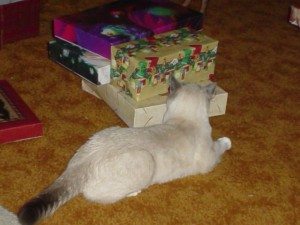 It seems to get earlier and earlier preparing for Christmas..Christmas music is everywhere, wrapping paper, sales and decorations galore. In the midst of getting into the spirit, keep in mind that some plants may be best to avoid especially if you have pets.
It seems to get earlier and earlier preparing for Christmas..Christmas music is everywhere, wrapping paper, sales and decorations galore. In the midst of getting into the spirit, keep in mind that some plants may be best to avoid especially if you have pets.
The ASPCA has a list of toxic/ posionous plants listed below:
Lilies Members of the Lilium spp.are considered to be highly toxic to cats. While the poisonous component has not yet been identified, it is clear that with even ingestions of very small amounts of the plant, severe kidney damage could result.
Marijuana
Ingestion of Cannabis sativa by companion animals can result in depression of the central nervous system and incoordination, as well as vomiting, diarrhea, drooling, increased heart rate, and even seizures and coma.
Sago Palm
All parts of Cycas Revoluta are poisonous, but the seeds or “nuts” contain the largest amount of toxin. The ingestion of just one or two seeds can result in very serious effects, which include vomiting, diarrhea, depression, seizures and liver failure.
Tulip/Narcissus bulbs
The bulb portions of Tulipa/Narcissus spp. contain toxins that can cause intense gastrointestinal irritation, drooling, loss of appetite, depression of the central nervous system, convulsions and cardiac abnormalities.
Azalea/Rhododendron
Members of the Rhododenron spp. contain substances known as grayantoxins, which can produce vomiting, drooling, diarrhea, weakness and depression of the central nervous system in animals. Severe azalea poisoning could ultimately lead to coma and death from cardiovascular collapse.
Oleander
All parts of Nerium oleander are considered to be toxic, as they contain cardiac glycosides that have the potential to cause serious effects—including gastrointestinal tract irritation, abnormal heart function, hypothermia and even death.
Castor Bean
The poisonous principle in Ricinus communis is ricin, a highly toxic protein that can produce severe abdominal pain, drooling, vomiting, diarrhea, excessive thirst, weakness and loss of appetite. Severe cases of poisoning can result in dehydration, muscle twitching, tremors, seizures, coma and death.
Cyclamen
Cylamen species contain cyclamine, but the highest concentration of this toxic component is typically located in the root portion of the plant. If consumed, Cylamen can produce significant gastrointestinal irritation, including intense vomiting. Fatalities have also been reported in some cases.
Kalanchoe
This plant contains components that can produce gastrointestinal irritation, as well as those that are toxic to the heart, and can seriously affect cardiac rhythm and rate.
Yew
Taxus spp. contains a toxic component known as taxine, which causes central nervous system effects such as trembling, incoordination, and difficulty breathing. It can also cause significant gastrointestinal irritation and cardiac failure, which can result in death.
Amaryllis
Common garden plants popular around Easter, Amaryllis species contain toxins that can cause vomiting, depression, diarrhea, abdominal pain, hypersalivation, anorexia and tremors.
Autumn Crocus
Ingestion of Colchicum autumnale by pets can result in oral irritation, bloody vomiting, diarrhea, shock, multi-organ damage and bone marrow suppression.
Chrysanthemum
These popular blooms are part of the Compositae family, which contain pyrethrins that may produce gastrointestinal upset, including drooling, vomiting and diarrhea, if eaten. In certain cases depression and loss of coordination may also develop if enough of any part of the plant is consumed.
English Ivy
Also called branching ivy, glacier ivy, needlepoint ivy, sweetheart ivy and California ivy, Hedera helix contains triterpenoid saponins that, should pets ingest, can result in vomiting, abdominal pain, hypersalivation and diarrhea.
Peace Lily (AKA Mauna Loa Peace Lily)
Spathiphyllum contains calcium oxalate crystals that can cause oral irritation, excessive drooling, vomiting, difficulty in swallowing and intense burning and irritation of the mouth, lips and tongue in pets who ingest.
Pothos
Pothos (both Scindapsus and Epipremnum) belongs to the Araceae family. If chewed or ingested, this popular household plant can cause significant mechanical irritation and swelling of the oral tissues and other parts of the gastrointestinal tract.
Schefflera
Schefflera and Brassaia actinophylla contain calcium oxalate crystals that can cause oral irritation, excessive drooling, vomiting, difficulty in swallowing and intense burning and irritation of the mouth, lips and tongue in pets who ingest.
Make sure the base of your tree where you water is covered so that your pet does not drink the water.
- Keep your tree in an area less frequented by your pets and elevated if possible. Needles can get lodged in the animal’s throat or even in his fur
- Remove strings and ribbons from gifts so that your pets do not think they are toys.
- Avoid using tinsel-very attractive to cats/dogs but dangerous as well..they can choke or even get sick. Some old tinsel has lead.
Hide the chocolate-make nice tasty treats healthy for both humans and animals. Batteries are also toxic!
- Tape electrical/light cords securely….no chewing or tangling up necessary.
- Avoid candles…there are all kids of flameless candles if you insist on the mood but eliniate the danger
So enjoy this pre-season and prepare wisely. If you have questions related to holiday hazards, please contact your veterinarian.

 Montreal Dog Blog Montreal's Online Dog Park
Montreal Dog Blog Montreal's Online Dog Park



